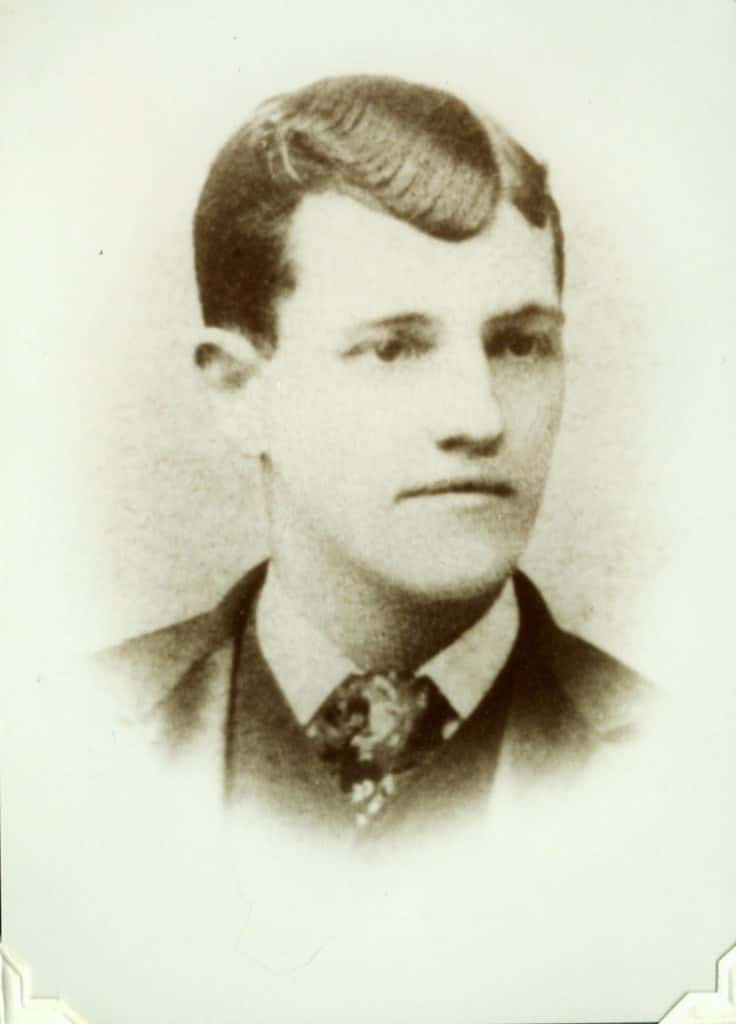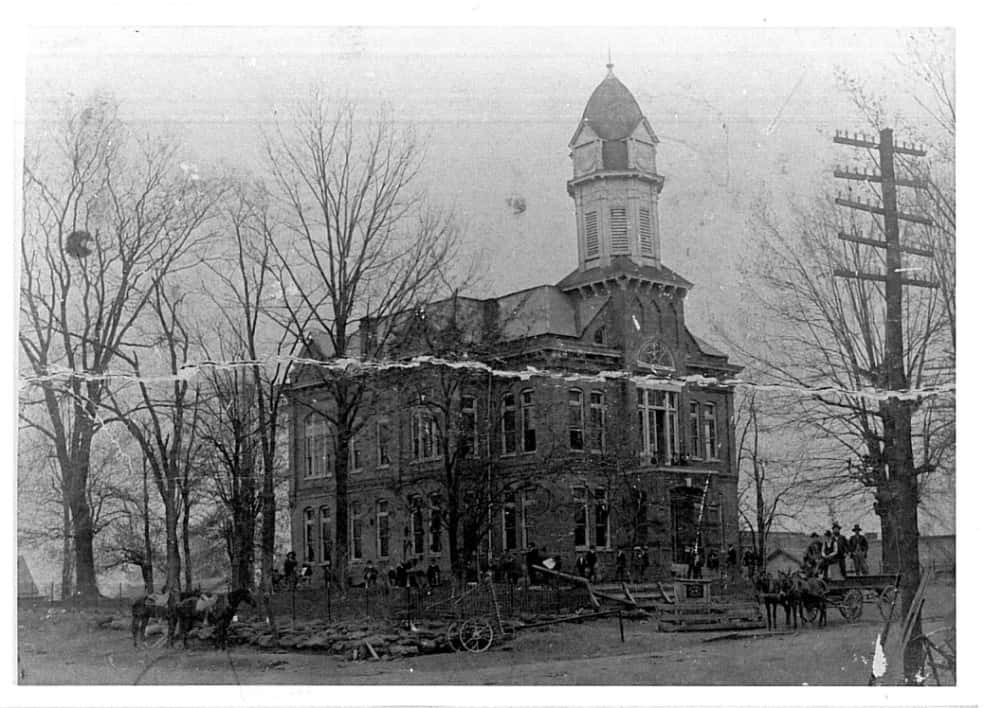When Politics Turned Deadly:
The Murder of Hardy Keys
Written by Justin D. Lamb


Hardy Keys (left) was killed by Sheriff Walter Holland on Friday, February 6, 1903 on the streets of Murray.
Right: The trial against Sheriff Walter Holland was held at the Marshall County Courthouse in 1905.
(Collection of the author)
On the evening of Friday, February 6, 1903, Lona Keys began to worry about her husband, Hardy Keys, who had gone to check on the construction of their new house just a few blocks from the Calloway County Courthouse. “I don’t know what is taking him so long,” Lona said to their daughter, Sadie. “Run up to the new house and see what is keeping him. Tell him his supper is getting cold.”
As instructed, Sadie walked the few blocks to the court square to fetch her father, but when she arrived he was nowhere in sight. Just as Sadie began to turn back to go home, she heard two shots ring out from the direction of the court square. Sadie rushed to see what was happening and she found her father unconscious, lying in a pool of his own blood. Frantically, Sadie called for help, but it was too late. Hardy Keys died on the streets of Murray. In shock, Sadie ran home to inform her mother of the tragic news and the Keys family soon demanded an answer as to who killed Hardy Keys.
Not long after, Sheriff Walter Holland admitted to shooting Keys in self-defense. Holland explained to the Murray Town Marshal that Keys had become angry when he learned of a political meeting in support of C.H. Bush, candidate in the upcoming election for Circuit Judge. Keys was a supporter of Bush’s opponent, Thomas P. Cook, and according to Sheriff Holland, he had been eavesdropping by the door. When confronted, Sheriff Holland said Keys ran at him with a knife.
In an article that appeared in the February 9, 1903 edition of the Paducah Evening Sun it was reported that “the tragedy was the outgrowth of politics. A political meeting was being held at the courthouse and the sheriff was in attendance. When the sheriff went outside he found Hardy Keys, a prominent Murray tobacco buyer, near the door. Sheriff Holland has told that he invited Keys in, whereupon Mr. Keys is alleged to have used some rather forcible language to decline the invitation. An argument ensued and Mr. Keys drew his knife and did not stop when commanded to and was shot by the sheriff.” Using the argument of self-defense, Sheriff Holland hoped to have the matter dropped, but he had no witnesses to the shooting.
The Keys family, however, disputed Sheriff Holland’s story and hired attorneys William Reed of Paducah and Sam Crossland of Mayfield to represent their interests in pursuing criminal charges against the sheriff who they believed wrongfully killed Keys. On February 19, 1903, an examining trial was held at the Calloway County Courthouse where attorneys Crossland and Reed pushed for a murder charge. However, Judge Swan discharged Holland and dismissed the case ruling that the shooting was in self-defense.
Not long after, though, the Grand Jury met and Sheriff Holland was indicted for manslaughter with his trial being set for the 1904 term of the Calloway County Circuit Court. In November 1903, Holland’s attorney’s made a motion to dismiss the case on the grounds that the Grand Jury was illegally drawn and influenced by County Clerk John H. Keys who was also the brother of the deceased Hardy Keys. The motion was overruled and the trial was set to proceed.
With the Calloway County community divided Commonwealth Attorney Daniel F. Smith of Cadiz was assigned to prosecute the case in April 1903 and he requested a change of venue on the grounds that a fair trial could not be held at Murray due to the prominence of both families involved. Six days later, the request was granted and the trial was moved to Benton in Marshall County.
After a continuance was approved on behalf of the defense, the trial finally began on March 17, 1905 in the Marshall County Circuit Court. The courtroom was crammed packed and hundreds lined the courtyard to hear the events unfold. Hotels and boarding houses were filled with people came from as far away as Hopkinsville and Clinton to witness the trial. Some of the best legal minds of the day took part in the trial including John G. Lovett, Fenton Simms, Jim Coleman, J.K. Hendricks, Sam Crossland, and William Reed. Circuit Judge Eli Brown of Owensboro presided.
The star witness for the prosecution was Hardy Keys’ daughter, Sadie, who testified that when she found her father lying on the sidewalk there was no knife beside his body. Sadie went on to say she never knew of her father ever owning or carrying a knife. The prosecutors argued that the knife was a “throw down” or an instrument that is tossed to the ground near an innocent victim by a murderer in order to make the act look in self defense. The prosecution painted Sheriff Holland as a “hothead” and brought into account the several other men he had shot and killed during his tenure as sheriff. Several witnesses were called to back this claim.
Sheriff Walter Holland took the stand, stuck to his story, and testified that he killed Hardy Keys in self defense. The defense presented a “surprise witness,” George M. Cox of Clinton, who testified that he saw the killing. Cox told jurors he saw Holland and Keys just ten feet apart when Keys angrily called Holland “a damned liar” and Holland fire two shots to protect himself. When asked by the prosecution why he had not come forward sooner, Cox had no answer. One of the defense lawyers created a huge sensation in the courtroom when he argued that Cox had been paid by Holland to say he witnessed the shooting.
Holland’s attorneys then called two expert witnesses, Professor C.M. Lieb, Superintendent of Schools in Paducah and Mr. James Wilcox, a well known civil engineer in Paducah, to the stand. Both men testified that the angle of the bullet entering Keys’ body showed that he was stretching back in an attempt to stab Holland. However, the prosecution countered that the bullet entered Keys’ body at a higher angle and exited four inches lower than it entered.
On March 27, 1905, the case was handed over to the jury. After two days deliberation, the jury found Sheriff Walter Holland guilty of manslaughter and he was sentenced to five years in the Eddyville Penitentiary. Immediately, Holland’s attorneys filed a motion before Judge Brown for a new trial which was quickly overruled. Sheriff Holland was placed in the Marshall County jail with no bail as his attorneys took their case to the Kentucky Court of Appeals. On April 1, a new trial was granted by the Court of Appeals and Holland was placed under a $6,000 bond and allowed to return home to Murray.
The new trial began in the spring of 1906 in Benton with much of the same testimony of the first. On March 23, 1906, Sheriff Walter Holland was acquitted of the murder of Hardy Keys and returned home to Calloway County. In 1908, Holland was re-elected to a second term as sheriff and later served as Chief of Police for the City of Murray where he was credited with stamping out the lawless night riding in the county at the time. Tragically in the summer of 1914, Sheriff Holland took his own life after being diagnosed with cancer.
For years, animosity over the Hardy Keys murder swept western Kentucky as the Holland and Keys families held a longstanding feud over the tragic events that took place on the Murray court square in February 1903. Fortunately, though, time heals most wounds and the families began to bury the hatchet. In the 1980s, Mary Holland Lancaster, a descendant of Sheriff Walter Holland, summed up the tragic events when she said, “The trial of Walter Holland portrays at two-family tragedy. Once such a tragedy happens, events and circumstances are frozen in time, but the relationships of friends, families, and descendants are not. Thankfully, these two families, the Hollands and Keys, have long forgotten, forgiven, and overcome this inglorious event.”
